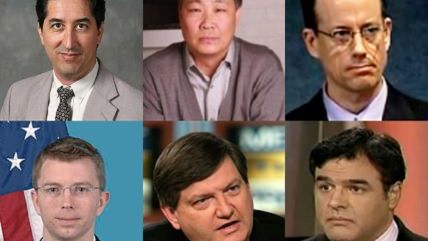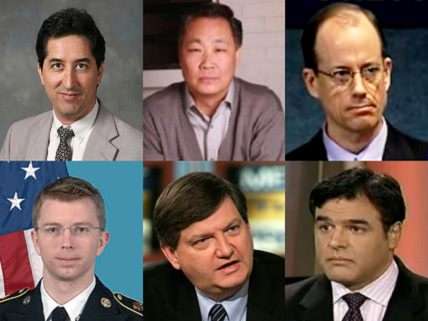All the President's Leaks Prosecutions
Six of nine prosecutions of leakers under the Espionage Act happened under Obama's term in office


The revelation that Fox News reporter James Rosen was tracked by the government in their effort to prosecute Stephen Jin-Woo Kim for passing "national defense information" (the ill-defined term used in the Espionage Act) comes on the heel of news that the Department of Justice seized a number of phone records from the AP in an effort to root out another leaker. The president insists he believes in an "unfettered" free press, but that nevertheless the government must balance that with the interests of "national security." So what information was Kim accused of passing? That North Korea might launch more nuclear tests in response to more sanctions, in 2009. The North Korean regime has conducted several nuclear tests in the intervening years.
In the AP case, reports suggest the Department of Justice is trying to ferret out the leaker behind a story about an alleged foiled terrorist plot in May 2012. News of the plot ran contradictory to the campaign narrative that Al-Qaeda posed no threat. The White House asked the AP to withhold the story until the government could announce the foiled plot itself; the AP waited until concerns about the ongoing intelligence operation were allayed. But it appears the source of the information that the plot was an inside job by a double agent could've been John Brennan, then the president's chief counterterrorism advisor, who told a conference call of talking heads the plot was never a threat to the U.S. because there was "insider control" of it.
As for the national security merits of other leakers prosecuted under the Obama administration, one of the first, Thomas Drake, was indicted in April 2010 for "mishandling" documents related to the leaking of information about the NSA's data collection efforts. The original charges were all dropped a year later. Also in 2010, a former FBI translator, Shamai Leibowitz, was sentenced to 20 months in prison for passing unidentified documents (even the presiding judge didn't know what was in them) to an unidentified blogger. Leibowitz said he believed the documents showed the government broke the law. In January 2011, Jeffrey Sterling was charged with passing information to a reporter about a Clinton era effort to sell bad nuclear weapons designs to Iran.
In January 2012, John Kiriakou, the first government official to acknowledge CIA waterboarding, became the sixth person during Obama's time in office charged under the Espionage Act for passing the names of CIA interrogators to journalists. Kiriakou eventually pled guilty and was sentenced to 30 months in jail.
The most well-known of the Obama administration's anti-leaks cases is the one against Bradley Manning, who President Obama announced had "broke the law" before any trial had begun Manning is accused of facilitating the largest leak in U.S. history, a cache of State Department cables and material related to the Iraq and Afghanistan wars published by Wikileaks. The judge in the Manning case has told prosecutors they will have to prove not just that Manning leaked the information, but that he knew he was aiding the enemy. In 2010, the Pentagon said none of the documents published by Wikileaks jeopardized U.S. intelligence or military operations, and a 2011 review by AP found that sources identified in leaked documents were not threatened. Manning's trial is set to begin next month.
The New York Times last year provided a run down of these six cases and the three like it that occurred before Obama's term in office, and here's a 1986 Time magazine article on Reagan's campaign against leakers (which yielded one of the three pre-Obama cases, that of Samuel Morison, who was pardoned by Bill Clinton in 2001).
Editor's Note: As of February 29, 2024, commenting privileges on reason.com posts are limited to Reason Plus subscribers. Past commenters are grandfathered in for a temporary period. Subscribe here to preserve your ability to comment. Your Reason Plus subscription also gives you an ad-free version of reason.com, along with full access to the digital edition and archives of Reason magazine. We request that comments be civil and on-topic. We do not moderate or assume any responsibility for comments, which are owned by the readers who post them. Comments do not represent the views of reason.com or Reason Foundation. We reserve the right to delete any comment and ban commenters for any reason at any time. Comments may only be edited within 5 minutes of posting. Report abuses.
Please to post comments


Voted "Most Likely to Nationalize the Press" in high school.
He's prosecuting Samwise? THAT BASTARD!
Well, he did threaten national security in helping to toss the Ring into Mount Doom. And he edited a book revealing the crime and certain military secrets.
If he dares prosecute Samwise, he'll face a serious backlash from the LGBT lobby.
Look, no one disputes that a free press is necessary for a free Middle Earth, but we can't have any Hobbits leaking information about the weakness of Men exemplified by the Boromir incident.
What if agents of Sauron saw it? Think of the damage to Gondor's security if he knew that Men are corrupt and fallible creatures that lust for power!
I heard Boromir was CIA.
"What difference, at this point, does it make?!" --Secretary of State Galadriel
I took a leak on a prosecutor once.
You're no Sandi. You're no Sandi at all.
Well, this should be a wake-up call to news orgs and national reporters that they need to control key pieces of their communications infrastructure, with control as close to the actual reporters as possible, Obviously, you can't do anything about search warrants, but you can still make the "secret" part very expensive or impractical to maintain.
Only leaks by the White House can be considered in the interest of national security, duh.
If I get pulled over doing 95 mph, can the CHP file conspiracy charges against my wife for telling me I needed to hurry home?
What we'd all like to know, of course, is how Obama ranks against Bush's efforts to suppress, control, or otherwise intimidate the media. Because the benchmark against which any government activity should be held is whether it exceeds Bush's crimes.
I think it's safe to say it's a push at the least.
The opinion of the NYT lawyer in the Pentagon Papers case is Obama is worse than Nixon in this regard.
http://www.nytimes.com/roomfor.....press-more
Ignore the title, which was probably written by an editor. Here's the opinion: "President Obama will surely pass President Richard Nixon as the worst president ever on issues of national security and press freedom."
Cheap Jerseys,Jerseys,Baseball Jerseys http://modernjerseys.org/
Wholesale Jerseys,Throwback Football Jerseys
http://mallsjersey.blogspot.com/